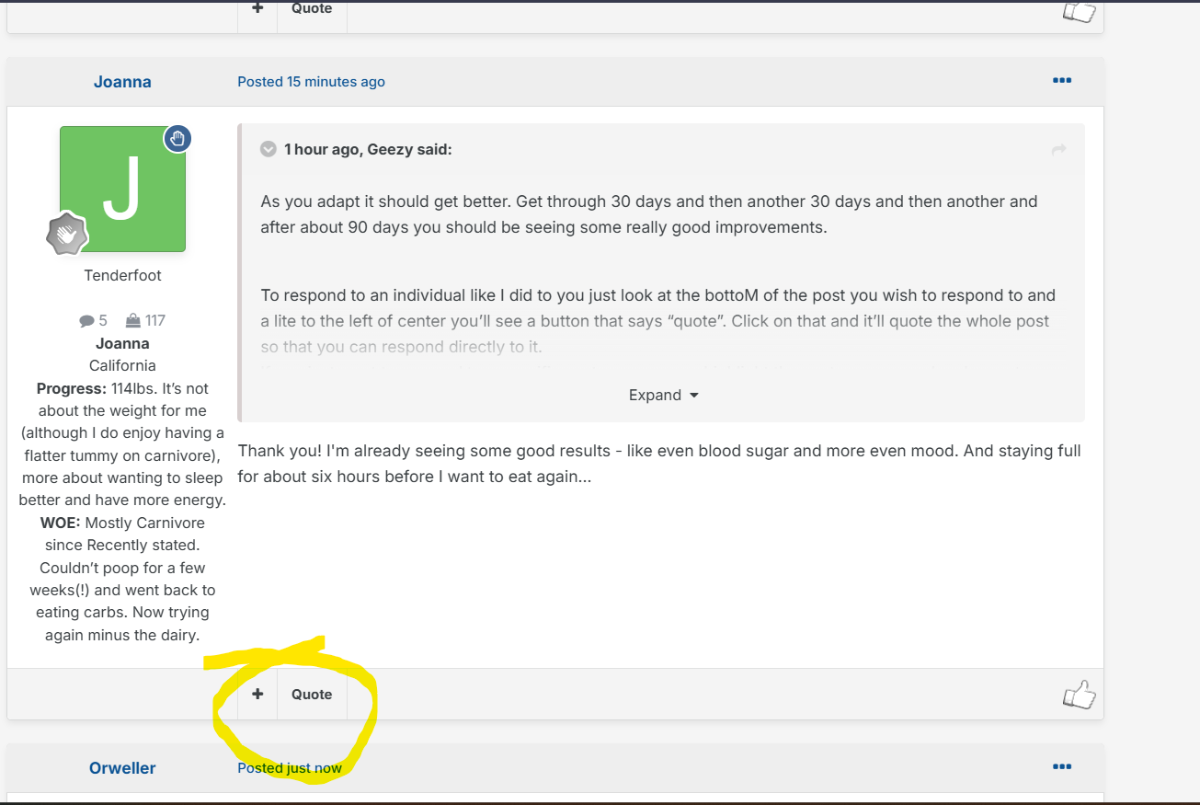Today is the first day of January and is also the first day of World Carnivore Month. To that end, let's challenge ourselves to eat a carnivore diet for the entire month of January. The type of carnivore diet and the level of strictness you choose to do is entirely up to you. Examples of carnivore diets include the following...
1) The Lion Diet. A person eating the Lion Diet only consumes the flesh of ruminant animals, water, and salt.
2) The BBBE Diet. BBBE is an acronym for Beef, Butter, Bacon, and Eggs.
3) The Carnivore Diet. This allows for the consumption of any and all animals and animal by-products, including dairy.
In any of the above examples, the object of course is to not consume any plants as part of your diet. Of course, we're not going to micromanage hoe you prepare your food, so your use of seasonings is entirely your own personal choice.
IF your circumstances don't allow you to go full on carnivore in January, then you can participate in this topic by challenge yourself to do better, above and beyond what you have been doing. For example, if you have still been eating grains, seed oils, refined sugar, or drinking alcohol, challenge yourself to avoid these items and just eat a clean, single ingredient whole foods diet such as clean keto, ketovore, or animal based.
We encourage you to check in daily, and share what you have eaten, perhaps a weigh-in if you're willing, and enjoy in some small talk. Participants in this topic will be entered into a drawing for a prize at the end of the month.







comment_39Source: https://www.dailymail.co.uk/femail/article-12382257/I-lost-121LBS-year-following-CARNIVORE-diet-cut-grocery-bill-60.html
I lost 121LBS in a year by following the CARNIVORE diet - and it also cut my grocery bill down by 60%
By RAVEN SAUNT FOR DAILYMAIL.COM
UPDATED:
A woman has revealed how she lost 121lbs in just one year after switching to the carnivore diet.
Amanda Lipstate, from Bellingham, Washington, has been candidly sharing her weight-loss transformation on social media after deciding to turn her life around.
The physical therapist, 33, said that she 'was in the depths of despair' when she weighed 360lbs and was keen for things to change.
Now, at 239lbs, she has revealed how her whole lifestyle has improved as well as claiming the switch in diet has helped cut her grocery bill by 60 per cent.
Amanda has said that she had been overweight since she was a teenager and was plagued with a whole host of health issues.
She told Newsweek that she was diagnosed with scleroderma - a rare autoimmune disease - aged 18 before also being told she had Raynaud's phenomenon - which impacts blood vessels in the hands and feet, sleep apnea and gastroesophageal reflux disease.
The quick succession of diagnoses left her battling with 'severe depression and anxiety' which often meant she 'wouldn't leave the house for months at a time.'
By aged 32, she weighed 360lbs, had type two diabetes and needed the aid of a walker to get around.
She wrote on her blog: 'For two decades of my life, I carried the weight of struggles that came with being obese.
'I battled against my own body, trying countless diets in the pursuit of transformation.'
But in June 2022, Amanda made the decision to turn her life around once and for all - and quickly landed on a solution.
She told the publication: 'What prompted this change was going to the hospital in severe pain thinking I was going to die.
'While sitting in the hospital bed I remember looking over at my husband and it struck me that all my choices in life had led me here.
'The next day, I went home and we got rid of all of the sugars and carbs in my house.'
Her blog post read: 'It was in the depths of my despair that I stumbled upon a revelation that would alter the course of my life forever - the carnivore diet.'
Amanda decided to make the switch to the regime which sees followers typically eat just meat, with no carbohydrates, vegetables, fruit, grains or nuts.
But she revealed that at first the transition wasn't easy, adding: 'I'd been eating the standard American diet for my entire life.
'I had to fully accept and understand that eating what I wanted led to me being morbidly obese and severely depressed.
'I'd experienced meat aversion a few times, but I realized that it was my brain throwing a tantrum wanting sugar and carbs.'
However, Amanda quickly started seeing improvements in her overall health as she was no longer suffering with joint pain, brain fog or fluid retention - and she no longer has type two diabetes meaning she does not need to regulate her glucose levels with medicine.
She said that she 'embraced the power of simplicity' and about six weeks after getting hooked on the diet she 'began to value' herself again.
Now, just over 12 months in, Amanda has lost a staggering 121lbs and believes her whole way of life has improved.
She also revealed that the diet had resulted in huge financial savings too as she cut her grocery bill down by 60 per cent.
Amanda is now hoping to encourage others to follow suit, concluding: 'The hardships I endured were not in vain; they served as the catalyst for my transformation.
'Through the carnivore diet, I not only discovered a way to heal my body but also uncovered a newfound purpose - a purpose that drives me to uplift and inspire others on their own paths to wellness.'
Subscribe to Carnivore Talk on YouTube | Be our guest on the channel | Leave me a voicemail, yo!